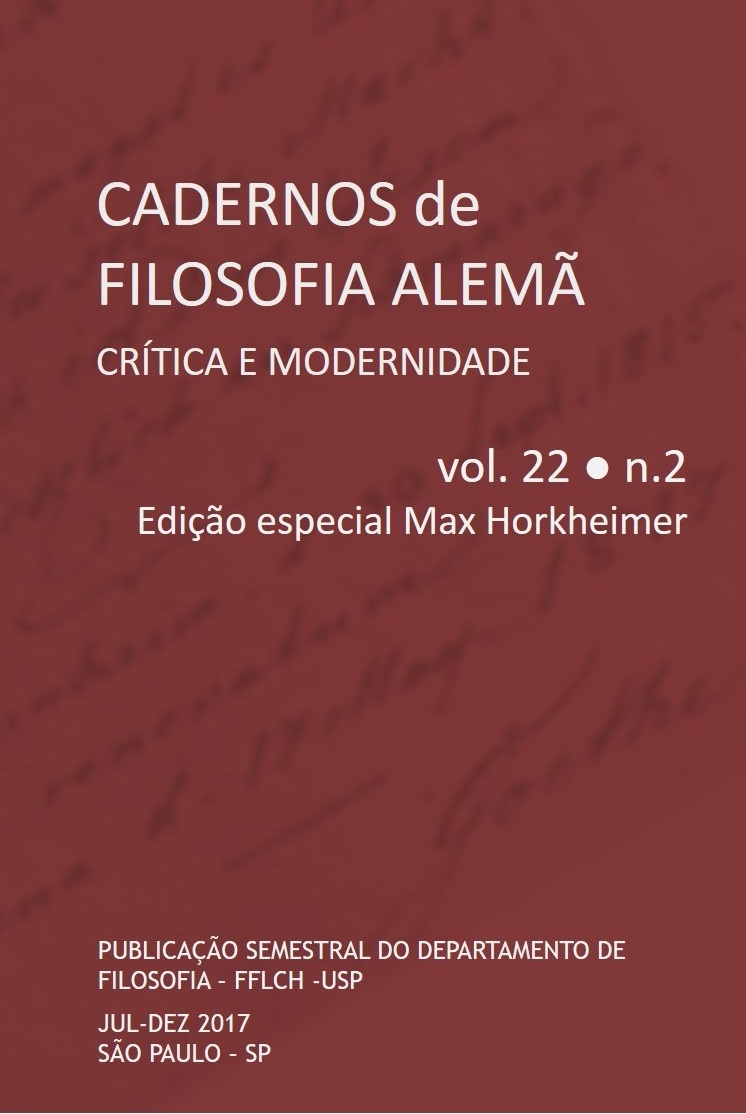Critique of the Left, Critique of Reason - An Overview on Horkheimer's Thought in the 1940s
DOI:
https://doi.org/10.11606/issn.2318-9800.v22i2p93-109Keywords:
esquerda, razão, Teoria Crítica, capitalismo de Estado, dominação, EsclarecimentoAbstract
In order to delineate an overview of Horkheimer's thought in the 1940s, two theses are defended: firstly, it is intended to support the idea that the critique of reason, which marks this period, is ultimately due to a critique of the left, as developed in the essay “Authoritarian State”. The second thesis, in turn, states that the critique of reason takes two paths in Horkheimer's work, in two almost simultaneous books: Dialectic of Enlightenment, in partnership with Th. W. Adorno, and Eclipse of Reason. The first work represents a way that can be called "Nietzschean", characterized by the identity between reason and domination. The second work, in turn, shows a "Kantian" way, which must deal in modernity with the conflict between subjective reason and objective reason.
Downloads
References
Abromeit, J. (2011). Max Horkheimer and the Foundations of the Frankfurt School. Cambridge: Cambridge University Press.
Dubiel, H. (1978). Wissenschaftsorganisation und politische Erfahrung. Studien zur frühen Kritischen Theorie. Frankfurt am Main: Suhrkamp.
Genel, K. (2013). Autorité et emancipation – Horkheimer et la Théorie Critique. Paris: Payot.
Habermas, J. (1987). Theorie des kommunikativen Handelns. Band I. Handlungsrationalität unde gesellschaftliche Rationalisierung. Frankfurt am Main: Suhrkamp.
____________. (2000). O discurso filosófico da modernidade. Tradução de Luiz Repa e Rodnei do Nascimento. São Paulo: Martins Fontes.
____________. (2015). “Max Horkheimer: sobre a história do desenvolvimento de sua obra”. In: Textos e contextos. Tradução de Antonio Ianni Segatto. São Paulo: Unesp.
Horkheimer, M., Adorno, T. (1947). Dialektik der Aufklärung. Philosophische Fragmente. In: Gesammelte Schriften. Vol. 5. Frankfurt am Main: Fischer, 1987.
Horkheimer, M. (1931). “Die gegenwärtige Lage der Sozialphilosophie und die Aufgaben eines Instituts für Sozialforschung”. In: Gesammelte Schriften. Vol. III. Frankfurt am Main: Fischer, 1988.
____________. (1936a). “Autorität und Familie”. In: Gesammelte Schriften. Vol. III. Frankfurt am Main: Fischer, 1988.
____________. (1936b). Egoismus und Freiheitsbewegung. Zur Anthropologie des bürgerlichen Zeitalters. Zeitschrift für Sozialforschung, 5, caderno 2. Reimpressão pela Deutscher Taschenbuch Verlag, 1980.
____________. (1937). Traditionelle und kritische Theorie. Zeitschrift für Sozialforschung. 6, caderno 2. Reimpressão pela Deutscher Taschenbuch Verlag, 1980.
____________. (1938). Montaigne und die Funktion der Skepsis. Zeitschrift für Sozialforschung. VII, caderno 1/2.
____________. (1939). Die Juden und Europa. Studies in Philosophy and Social Science, 8, caderno 1. Reimpressão pela Deutscher Taschenbuch Verlag, 1980.
____________. (1940). “Autoritärer Staat”. In: Gesammelte Schriften. Vol. V. Frankfurt am Main: Fischer, 1987.
____________. (1941a). The End of Reason. Studies in Philosophy and Social Sciences. 9(3). Versão alemã (1942): “Vernunft und Selbserhaltung”. In: Gesammelte Schriften. Vol 5. Frankfurt am Main: Fischer, 1987.
____________. (1941b). Preface. Studies in Philosophy and Social Sciences, 9, (2). Reimpressão pela Deutscher Taschenbuch Verlag, 1980.
____________. (1943). “On the Sociology of Class Relations”. In: nonsite.org, 18, janeiro de 2016.
____________. (1947). Eclipse of Reason. London: The Continuum, 2004.
____________. (2008). A life in letters. Selected Correspondence. Lincoln/Londres: University of Nebraska Press.
Jay, M. (2008). A imaginação dialética. História da Escola de Frankfurt e do Instituto de Pesquisas Sociais – 1923-1950. Rio de Janeiro: Contraponto.
Marramao, G. (1975). Political Economy and Critical Theory. Telos, 24, pp.56-80.
Marin, I., Nobre, M. (2012). Uma nova antropologia. Unidade crítica e arranjo interdisciplinar na Dialética do Esclarecimento. Cadernos de filosofia alemã, 20, pp.101-122.
Nobre, M. (1996). “Lukács e o materialismo interdisciplinar”. In: Antunes, R., Rego, W. L. (orgs.). Lukács – um Galileu no século XX. São Paulo: Boitempo.
__________. (1998). A dialética negativa de Theodor W. Adorno. A ontologia do estado falso. São Paulo: Iluminuras.
__________. (2008). “Max Horkheimer: A Teoria Crítica entre o nazismo e o capitalismo tardio”. In: Nobre, M. (org.). Curso livre de Teoria Crítica. Campinas: Papirus.
Petry, F. B. (2013). O conceito de razão nos escritos de Max Horkheimer. Cadernos de filosofia alemã, 22, pp.31-48.
Pollock, F. (1941). State Capitalism: its Possibilities and Limitations. Studies in Philosophy and Social Sciences, IX (2).
Postone, M., Brick, B. (1993). “Critical Theory and Political Economy”. In: Benhabib, S., Bonss, W., McCole, J. (orgs.) On Max Horkheimer. New Perspectives. Cambridge, Londres: The MIT Press.
Rosa, L. (2011). “Questões de organização da social-democracia russa”. In: Loureiro, I. (org.). Rosa Luxemburgo – textos escolhidos. Vol. I. São Paulo: Unesp.
Rugitsky, F. (2008). “Friedrich Pollock: limites e possibilidades”. In: Nobre, M. (org.). Curso livre de Teoria Crítica. Campinas: Papirus.
Stirk, P. (1992). Max Horkheimer: a new Interpretation. Hemel Hempstead/Lanham: Harvester Wheatsheaf/Barnes & Noble Books.
Schmidt, J. (2007). The Eclipse of Reason and the End of the Frankfurt School in America. New German Critique, 100, pp.47-76.
Wiggershaus, R. (1994). The Frankfurt School: Its History, Theories, and Political Significance Studies in Contemporary German Social Thought. Cambridge: The MIT Press.
Downloads
Published
Issue
Section
License
Information and conceptions on the texts are complete responsibility of the authors.
All the articles submitted before July 5th 2018 and those published after July 2021 are licensed under a CC BY-NC-ND license – except those published between the aforementioned dates, which are under the CC BY-NC-SA license. The permission for the translation of the material published under the license CC BY-NC-ND by third parts can be obtained with the consent of the author.
Open access policies - Diadorim
Rules applied before July 5th 2018:
Presenting a submission to our Editorial Board implies granting priority of publication for “Cadernos de filosofia alemã”, as well as transferring the copyright of texts (once published), which will be reproduced only with the manifest authorization of the editors. Authors keep the right to reuse the texts published in future editions of their work, without paying any fees to "Cadernos”. We will not grant the permission to re-edit or translate the texts for third parts without agreement of the author.


